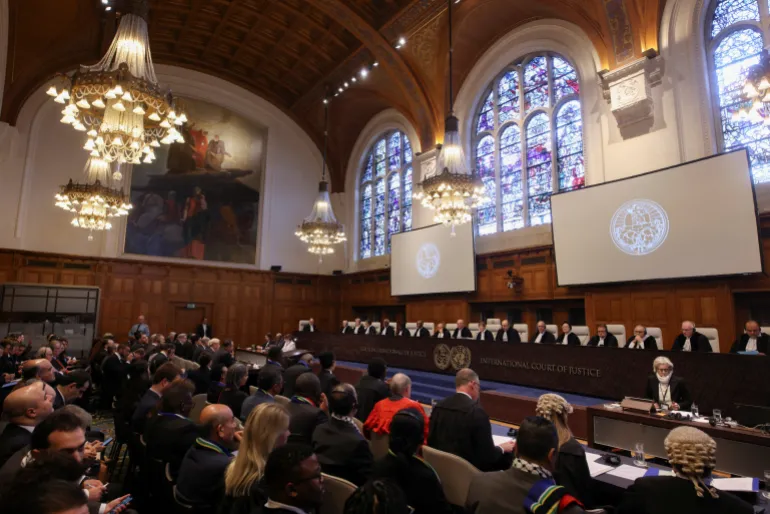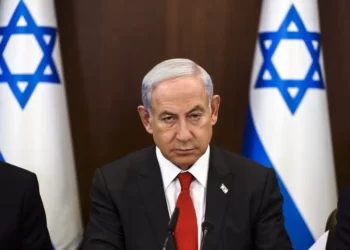The International Court of Justice (ICJ) has finished hearing South Africa’s arguments on the case that Israel is committing genocide in its war in Gaza.
The hearing of South Africa’s genocide case against Israel started with ICJ President, Joan Donoghue introducing South African Judge, Dikgang Ernest Moseneke and Israeli Judge, Aharon Barak.
Lawyers representing South Africa stressed that “Palestinians in Gaza are entitled to exist” and “there is an urgent need for provisional measures to protect Palestinians in Gaza from the irreparable prejudice caused by Israel’s violation of the Genocide Convention.”
While the hearing was taking place inside the ICJ, pro-Palestinian demonstration took place outside.
Vusimuzi Madonsela, South Africa’s Ambassador to the Netherlands, said his country “acknowledges that genocidal acts and permissions by Israel inevitably form part of a continuum of illegal acts perpetrated against the people, Palestinian people since 1948”.
Madonsela told the court that South Africa has come to the ICJ “to prevent genocide and to do so in the discharge of the international obligation that rests on South Africa and all other states under the convention.”
“The consequences of not indicating clear and specific provisional measures and not taking steps to intervene while Israel disregards its international obligations before our eyes would, we fear, be very grave indeed: for the Palestinians in Gaza who remain at real risk of further genocidal acts, for the integrity of the convention, for the rights of South Africa, and for the reputation of this court which is equipped with and must exercise its powers to afford an effective realisation of the rights under the convention.”
Vusimuzi Madonsela
South Africa’s Justice Minister, Ronald Lamola said that the country was extending its hands to the people of Palestine “in full knowledge that that we are part of a humanity.”
Adila Hassim, a Lawyer representing South Africa’s case stated that “South Africa contends that Israel has transgressed Article 2 of the Genocide Convention by committing actions that fall within the definition of genocide.”
Tembeka Ngcukaitobi, another lawyer, said Israel’s “genocidal intent against the Palestinians in Gaza is evident from the way in which Israel’s military attack is being conducted.”
Ngcukaitobi brought attention to Israeli Prime Minister Benjamin Netanyahu’s comments on October 28, 2023, urging ground troops preparing to enter Gaza to “remember what Amalek has done to you.”
“This refers to the Biblical command by God to Saul for the retaliatory destruction of an entire group of people,” the lawyer said.
“The genocidal invocation to Amalek was anything but idle. It was repeated by Mr Netanyahu in a letter to the Israeli armed forces on November 3, 2023”, he added, noting that the prime minister’s invocation is being used by Israeli soldiers to justify the killing of civilians in Gaza.
Ngcukaitobi proceeded to show a video shared on social media where soldiers were filmed chanting and singing, “May Gaza be erased”.
Professor Max du Plessis, a lawyer representing South Africa asserted that what is happening in Gaza now is “not correctly framed as a simple conflict” between two parties.
“It entails, instead, destructive acts perpetrated by an occupying power, Israel, that has subjected the Palestinian people to an oppressive and prolonged violation of their rights to self-determination for more than half a century.
“Those violations occur in a world where Israel, for years, regarded itself as beyond and above the law.”
Professor Max du Plessis
Another lawyer, Vaughan Lowe, stated how South Africa’s case has met the ICJ’s requirements for provisional measures. He also stated why South Africa did not seek any court order against Hamas, saying among other reasons, that Hamas is not a state and cannot be a party to the Genocide Convention and cannot be a party to the proceedings.
After South Africa’s representatives concluded their arguments, ICJ President, Joan Donoghue announces that the hearing is adjourned and that the court will meet tomorrow, Friday, January 12, 2023, to hear Israel’s oral arguments.
Lecturer Hails South Africa’s Case
Thomas MacManus, senior lecturer in state crime at the School of Law, Queen Mary University of London, opined that South Africa’s case was “very impressive.”
“They set out in a very concise way some devastating accusations strung together in such a legally sound way,” MacManus said.
He added that he was impressed by the way its representatives presented the conduct and intent as well as their points related to jurisdiction.
He noted that South Africa’s arguments related to the urgency of the case will be “the most devastating” from Israel’s point of view.
Professor Alanna O’Malley also called South Africa’s case “extremely compelling” and “well organised.”
READ ALSO: Kumasi Central Market Project: Aggrieved Traders Decry NPP Government’s Disappointment





















